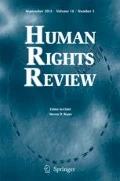Conclusion
In his book, World Poverty and Human Rights, Pogge sets out to articulate an approach to basic justice that is inversal and cosmopolitan. This notion of justice is to be articulated through the language of human rights. Pogge’s arguments about justice, moral universalism and cosmopolitanism are impressive and reward serious study. It is to be hoped. indeed, that many aspects of his argument might be adopted by the elite ruling classes of world politics; they have much to offer in the project of creating a world that is humane for all.
The issues that I have raised in the foregoing argument however are central to the integrity of Pogge’s project. I have argued, in sum that it is not possible to advance a program for the expansion of justice and the implementation of human rights in world politics without making an appeal to a specific account of the nature of justice and of human rights. The account that informs Pogge’s argument is that of political liberalism, and this is an account that has much in its favor as a preferred vehicle for justice in world politics. However, this account makes itself vulnerable when it argues for universal principles without acknowledging their partisan and normative base. My argument has been that this issue is at the center of Pogge’s attempt to isolate the conception of human rights he explicates, which he wants to serve as the language for his global ethical universalism, from the ontological affirmations which make that conception of human rights possible, and which of necessity tie human rights to a specific conception of the nature of the good for human persons and groups. The attempt to establish a single, universal criterion of justice, and to express it in the language of human rights, is undermined from within for as long as it fails to engage with ontological concerns.
Similar content being viewed by others
Bibliography
Bauer, Joanne R. and Daniel A. Bell. 1999. The East Asian Challenge for Human Rights Cambridge: Cambridge University Press.
Beiner, Ronald. 1992. What's the Matter with Liberalism?, Berkeley: University of California Press.
Bell, Daniel A. 1993. Communitarianism and its Critics. Oxford: Oxford University Press.
Cranston, Maurice. 1973. What Are Human Rights, London: The Bodley Head LTD.
Crowder, George. 2002. Liberalism and Value Pluralism. London: Continuum.
Forrester, Duncan B. 2001. On Human Worth, London: SCM Press.
Forsythe, David P. 2000. Human Rights in International Relations. Cambridge: Cambridge University Press.
Gaete, Rolando. 1993. Human Rights and the Limits of Critical Reason, Dartmouth: Aldershot.
Gaita, Raimond. 1999. A Common Humanity: Thinking about Love and Truth and Justice. Melbourne: The Text Publishing Company.
Galston, William A. 2002. Liberal Pluralism: The Implications of Value Pluralism for Political Theory and Practice. Cambridge: Cambridge University Press.
Grant, George Parkin. 1985. English Speaking Justice. Indiana: University of Notre Dame Press.
Gray, John. 1989. Liberalisms: Essays in Political Philosophy, London: Routledge.
Haakonssen, Knud. 1996. Natural Law and Moral Philosophy. Cambridge: Cambridge University Press.
Kamenka, Eugene. 1978. “The Anatomy of a Idea,” in Kamenka and Alice Erh-Soon Tay. (eds) Human Rights, Port Melbourne: Edward Arnold (Australia), 1–10.
Kamenka, Eugene and Alice Erh-Soon Tay. 1978. Human Rights. Port Melbourne: Edward Arnold (Australia).
Katongole, Emmanuel. 2000. Beyond Universal reason: The Relationship Between Religion and Ethics in the work of Stanley Hauerwas. Notre Dame, Indiana: University of Notre Dame Press.
Kok-Chor Tan. 2000. Toleration, Diversity and Global Justice. Pennsylvania: The Pennsylvania State University Press.
Kovesi, Julius. 1967. Moral Notions, London: Routledge and Kegan Paul.
Langlois, Anthony J. 1998. “Redescribing Human Rights,” Millennium: Journal of International Studies, 27(1): 1–22.
Mouffe, Chantal. The Return of the Political. London: Verso, 1993.
Mouffe, Chantal. The Return of the Political, London: Verso, 1993.
Murdoch, Iris. 1998. Metaphysics as a Guide to Morals. Sydney: HarperCollins.
Perry, Michael J. 1998. The Idea of Human Rights: Four Inquiries, Oxford: Oxford University Press.
Rorty, Richard. 1993, “Human Rights, Rationality, and Sentimentality” in Stephen Shute and Susan Hurley (eds), On Human Rights: The Oxford Amnesty Lectures 1993, London: Basic Books, 111–134.
Rouner, Leroy. 1997. Is there a Human Nature? Notre Dame: University of Notre Dame Press.
Sher, George. 1997. Beyond Neutrality: Perfectionism and Politics, Cambridge: Cambridge University Press.
Shue, Henry. 1980. Basic Rights, Princeton: Princeton University Press.
Shute, Stephen and Susan Hurley. 1993. On Human Rights: The Oxford Amnesty Lectures 1993, London: Basic Books.
Stoljar, Samuel. 1984. An Analysis of Rights, New york: St Martin's Press.
Tan, Kok-Chor. 2000. Toleration, Diversity and Global Justice, Pennsylvania: Pennsylvania State University Press.
Taylor, Charles. 1989. Sources of the Self, Cambridge: Cambridge University Press.
Taylor, Charles. 1999. “Conditions of an Unforced Consensus on Human Rights,” in Bauer and Bell (eds), The East Asian Challenge for Human Rights, Cambridge: Cambridge University Press, 124–144.
Tuck, Richard. 1979. Natural Rights Theories: Their Origin and Development, Cambridge: Cambridge University Press.
Rights and permissions
About this article
Cite this article
Langlois, A.J. Conceiving human rights without ontology. Hum Rights Rev 6, 5–24 (2005). https://doi.org/10.1007/s12142-005-1016-x
Issue Date:
DOI: https://doi.org/10.1007/s12142-005-1016-x




